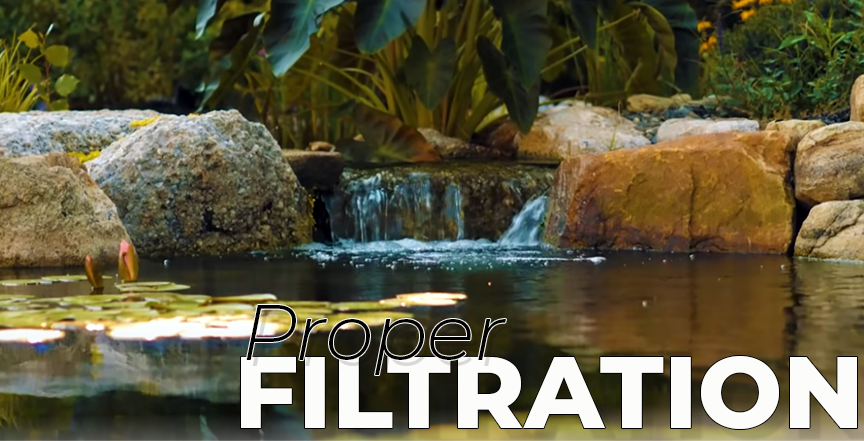
What Filtration System Is Best for a New Jersey Koi Pond?
Maintaining a clean, healthy pond for koi fish requires a robust filtration system to manage waste and improve water quality. With New Jersey’s varied climate, choosing the right filtration system is crucial to handling seasonal changes and ensuring a balanced pond ecosystem. Let’s dive into the top options for New Jersey koi pond filtration.
1. Understanding the Types of Pond Filtration
Koi pond filtration systems typically combine two types of filters:
- Mechanical Filtration: Removes solid waste, debris, and particles from the water.
- Biological Filtration: Uses beneficial bacteria to break down ammonia and nitrites, which helps keep the water safe for koi.
For New Jersey koi ponds, a combination of both is essential. Mechanical filters prevent debris buildup, while biological filters maintain a stable nitrogen cycle, even during New Jersey’s temperature fluctuations.
2. Pressurized Filters for Efficient Filtration
Pressurized filters are a popular choice for New Jersey koi ponds due to their compact design and efficiency. These filters force water through a series of media layers, capturing waste and promoting beneficial bacteria growth.
- Advantages: They’re powerful, easy to clean, and work well with UV clarifiers for algae control.
- Best For: Ponds with a moderate number of koi, as they can handle higher fish loads without reducing water clarity.
3. Bead Filters for Larger Koi Ponds
Bead filters are highly effective for larger New Jersey koi ponds. They use small plastic beads as the filtering medium, providing an extensive surface area for bacteria colonization. Bead filters handle high fish loads, which is ideal for koi ponds with more substantial populations.
- Advantages: Excellent at biological filtration and self-cleaning features.
- Best For: Large, heavily stocked koi ponds where water clarity and ammonia control are essential.
4. Gravity Flow Systems for Natural Filtration
Gravity flow systems mimic natural filtration by allowing water to flow through different filtration stages using gravity. These systems often include settlement tanks, mechanical screens, and biological chambers.
- Advantages: Gentle on fish and provides thorough filtration.
- Best For: Eco-conscious pond owners and larger ponds, as gravity systems can be space-consuming.
In New Jersey, gravity systems work particularly well during the warm months, maintaining steady water flow and reducing stagnant areas that encourage algae growth.
5. UV Clarifiers for Algae Control
Algae is a common issue for koi ponds in New Jersey, especially during hot summers. UV clarifiers work with your filtration system by using ultraviolet light to kill single-celled algae, keeping your pond water clear without harming fish or beneficial bacteria.
- Advantages: Control green water, which is common in sun-exposed ponds.
- Best For: Ponds that experience frequent algae blooms or are in direct sunlight.
A UV clarifier is an excellent addition to any koi pond filtration setup, particularly in New Jersey, where summer temperatures can quickly encourage algae growth.
6. Choosing the Right Size for Your Pond
Selecting the right filter size is essential for effective filtration. A general rule of thumb is to choose a filter rated for at least 1.5 times the volume of your pond. Koi are messy fish, and under-filtering a koi pond can lead to water quality issues. For instance, if your New Jersey pond holds 2,000 gallons, choose a filter rated for 3,000 gallons or more.
7. Maintaining Your Filtration System
Regular maintenance is key to keeping your filter system efficient:
- Backwash and Clean Filters: Pressurized and bead filters often have backwash features for easy cleaning. Schedule regular backwashing to prevent clogs and maintain water quality.
- Replace Media as Needed: Mechanical filter media can wear down over time. Check your filter’s instructions for replacement schedules.
- Winterize the System: In New Jersey, winterizing your filtration system is essential to prevent damage. Disconnect pumps and store them indoors, or switch to a winter-safe setup to protect against freezing temperatures.
Final Thoughts
The best filtration system for a New Jersey koi pond combines mechanical and biological components, sized appropriately for the pond’s volume and fish load. Adding UV clarifiers and maintaining regular cleaning can further enhance water quality, providing your koi with a safe, clear environment all year.
Need help choosing a filter for your New Jersey koi pond? Contact Atlantis Water Gardens today for expert guidance on
selecting and installing the best filtration system for your pond’s unique needs!
What Filtration System Is Best for a Koi Pond?
Is adding a biological filter necessary for koi ponds in Morris County, NJ?
Yes! A biological filter in Morris County helps break down waste and supports beneficial bacteria for a healthy pond.
Should I consider adding a pressurized filter to my koi pond in Short Hills, NJ?
Absolutely! A pressurized filter in Short Hills provides high-efficiency filtration, reducing debris buildup.
How does adding a waterfall filter improve koi pond water quality in Millburn, NJ?
A waterfall filter in Millburn increases oxygen levels and aids in natural filtration for a healthier ecosystem.
Can adding a secondary mechanical filter help with large koi ponds in Hunterdon County, NJ?
Yes! A secondary mechanical filter in Hunterdon County catches extra debris, preventing water quality issues.
Why Should New Jersey Homeowners Winterize Fountainscapes?
Why Are My New Jersey Koi Fish Hanging Around My Waterfall?
Elevate Your Landscape with a Backyard Fountain
For more content with tips, tricks and amazing water feature goodness, check us out on YouTube!